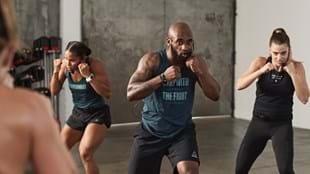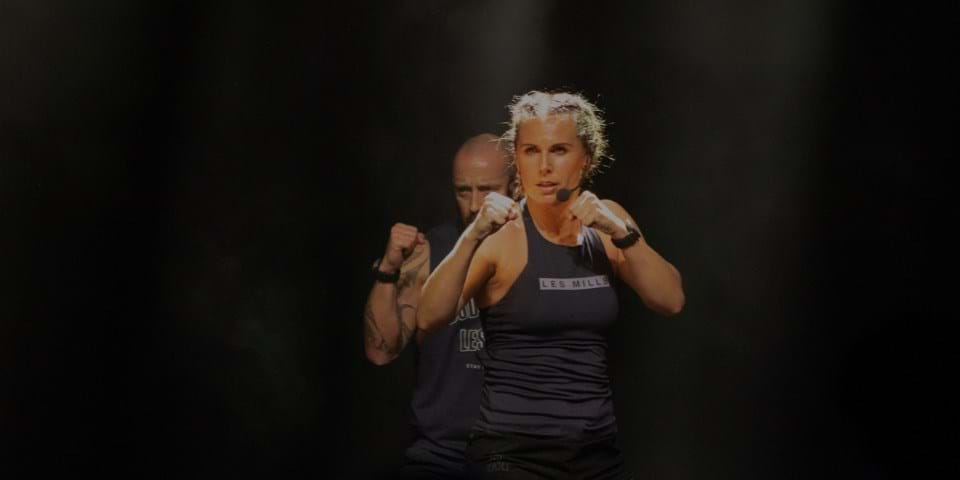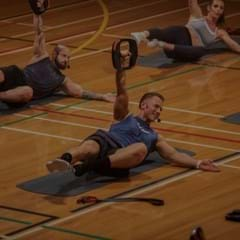SARAH SHORTT:
Hi Marlon! You’re currently enrolled in school in Sydney. This is your third MA, is that right?!
MARLON WOODS:
[Laughs] Yeah, I’m a career student. Every time I graduate I’m like, that’s it and then six months later I’m back in school.
School in Australia wasn’t part of my original plan though. I had my whole life planned out, literally step by step up until I became president in 2036 – which I was on par to make until I opened my gym in 2016. Before then I checked off every step: school, my bachelors, masters, military service, work experience… I was nailing everything I was supposed to and the next thing was to run for office back home in Cincinnati. But then I opened my gym in Augusta which delayed things, met my girlfriend (Felicity) and moved to Australia. So I’ve had to push my presidential campaign back to 2044.
When people say, what do you want to do? I say, I want to be the president, and I am dead serious about that.
In terms of your drive – where does that come from?
I don’t want to get all therapist on the couch on you but you know I never really got congratulations from my Dad early on in my life. I didn’t realise it at the time, but it instilled in me this need to succeed, to prove that I can do this. My Dad praised my friends and cousins way more than me so I became obsessed with outdoing as many people as I could. I was really good at sports but I was short, so I knew that wasn’t going to be the way. So I thought, well if I can’t do that then I have to be able to do 15 other things very well. I took on the outlook of: jack of all trades, master of none. I’d rather be able to pick up five things and do them very well than master one thing, and I think my versatility is one of my best assets.
I had experience of being very poor growing up and I didn’t want that again. I had an idea of how I wanted my life to play out so I made sure that I gave myself as many options as possible, to open as many doors as I could, and this obsession just gets worse as I get older. As I get older I think, OK cool you’ve had these four jobs, you’ve got these two degrees, you can do any of these seven different things but that’s not enough... My resume reads like a job dictionary; there’s a lot of different things I can do and that’s because I never want to be without.
So if being the best is important to you, how do you cope with failure?
I don’t handle failure very well. The last thing I failed was seven years ago, when I took a test to be a service officer for the US Department of State, and I missed the pass mark by two points. That hit me like a ton of bricks and I sat on that for months like, how could you let this happen? What do you think you’re doing? You have to be better than this and now you have to do five things very well to make up for that failure. I still think about it to this day and I still remember very starkly how that failure made me feel, where I was, what I was wearing… it bothered me a lot.
That definitely comes from feeling that I wasn’t enough very early on and even now my father still doesn’t give me praise. My accomplishments are just kind of thrown to the side, dismissed, and I’ve watched every person he praised growing up not measure up to what they were supposed to be. I’ve waited for him to say, you know I should have been really supportive of you and I’m really proud of what you’ve done – and I haven’t gotten that yet.
After my last visit home, after talking to him, I was reflecting and realised, that’s why I’ve been doing all of this stuff – I’m waiting on you to say I’m proud of you and it has not come no matter what I do: the military, opening my own gym, my four degrees, Les Mills, getting into school… none of it has got him to say, I’m proud of you.
You have a lot going on, how do you balance all of the different elements in your life?
My girlfriend says, can you just sit down and enjoy what you’re doing right now? But I’m already five steps ahead thinking, if I can do this thing for a year then it would give me this experience and then in two years I can do this and become a professor, then maybe I could work for this company… I paint these pictures and make these plans years out but I’m never in the moment. I can be present with other people but I can never be present with myself. I struggle with that.
12 months ago I said I wanted to be in school in Sydney, teaching classes and just relaxing and I got that within three months. Immediately after I got that stuff I went into a depression because I was like, I’m not doing enough, and I was upset and frustrated for months. I pulled myself out of that, regrouped and focused back in, and then I went full steam ahead again and then picked up two more things, and picked up another thing and another thing. I have to actively tell myself “no more”.
I was in a hotel in Melbourne a few weeks ago, lying on the bed and thought, I’m not doing enough for the world. So I applied for two jobs in international development to work with marginalised populations and my girlfriend was like, what are you doing? I said, I don’t know, I just feel like I’m not doing enough, not making enough change, not touching enough lives.
My trigger is idleness. The idea of being idle makes me feel insecure and when I have those feelings I do bad things like apply for jobs or do things that are outside of my values. Being aware of [this trigger] helps but it’s still hard to stop. It sounds like a weird thing to stop but it’s like a drug. I go into this fit and I want to do, do, do, do, do… I can’t just have four jobs and just be doing the four jobs, I need another one to up the ante. I need to just enjoy the things I’m doing now and realise that they’re awesome. I’m the last person that would say anything I’m doing is awesome: I think, no, Marlon, you need to raise the bar.
How has your experience of failure affected what it’s like taking feedback?
That failure made me feel like I was not good enough, essentially. Rather than, Marlon failed a test – I thought, Marlon is a failure, and that made me much more anxious and much more insistent at never failing at anything again. In one way it pushed my work ethic and my drive to levels that they had never been at before, but it came from a bad place.
When I first started teaching and getting feedback I struggled. You’re telling me that that wasn’t perfect? I attached myself to everything that I did because of that test, and so when I started to first receive feedback I was anxious, defensive, and stressed. However, as I started getting more and more feedback I realised that I could not keep going through this, so I had to try and separate myself from the presentation.
I had a conversation with KG [Kylie Gates] last filming round about being attached to things, and trying to separate myself from the presentation. That’s helped me immensely with not taking feedback so personally. Les Mills has really helped me to create some space between myself and my successes and failures.
I wouldn’t be doing a good interview if I didn’t ask you about Instagram! You post in a certain way, I’m guessing you’re quite deliberate in how you show up on social media?
I first got Instagram in 2016, and at that stage it was all to promote my gym. I was into bodybuilding and power lifting so everything I posted was your standard bodybuilder, fit fam stuff: lifting weights, workouts, come in for a 7-day pass, check out my abs blah blah blah… but it didn’t sit well with me at all. And then as I was teaching I started your standard, here’s a snippet of me teaching this in class, here’s a picture of my clothes… and that didn’t sit well either.
Eventually I was like you know what, I’m gonna take social media seriously. What does Marlon enjoy? Who is Marlon? And I was like, well, Marlon is funny. I started posting humorous stuff, doing skits, and created a bunch of different characters. And that was cool for a while but eventually it got to a point where I kind of felt like a clown and that I had boxed myself in to this type of post. It got to a point where I didn’t feel like doing the videos.
Now I’m about simple positivity. I post motivational and inspirational things that reflect my thoughts. If anyone reads anything on my profile, I want it to be a positive experience for them.
What has teaching done for you?
The most important thing to me is the fact that people will leave work early, get changed in the car, run across the gym... just to get to your class. Time is the most the most unrenewable and coveted resource we have, so for someone to give you their time is huge. When I’m on stage I’m going to give you everything I have, because this could be your only hour of the week to work out. It doesn’t make me feel important, it makes me feel responsible for delivering the experience. I’m accountable to these people who have given me their time.
I also love teaching because it forces me to be present for an hour. When I’m in class I can’t focus on anything else and I love it. When I first opened my gym I was broke, and I went into a depression. Class was my reprieve because it was the only time that I couldn’t think about anything else. I poured myself into my classes during that time because it was the only time I could be present and as soon as class was over I was so sad, because I had to go back to reality. Those were some of the best classes I ever taught – when I was depressed - because when I was in there I was present and I realised what it did for me. And so I tapped into that to realise what it can do for other people. Human connection is a powerful thing.
Marlon Woods is a Les Mills Ambassador who teaches BODYCOMBAT™, BODYPUMP™ and LES MILLS TONE™. He is currently based in Sydney, Australia, where he is a PhD student in social psychology at the University of Sydney. Follow Marlon on Instagram.








